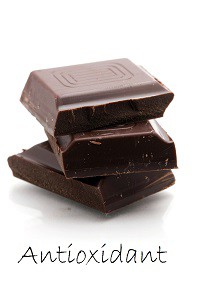Written by Marcia J. Egles, MD. A large study of 67,640 Swedish adults shows that those who ate 3-4 servings of chocolate per week significantly reduced their risk of myocardial infarction by 20% compared to non-consumers of chocolate.
 A large study from Sweden shows a reduction in the risk of heart attacks among chocolate eaters. The recent study reported a 13 % reduction in the incidence of myocardial infarction (heart attack) among those who routinely consume more than three to four servings of chocolate weekly as compared to those who eat no chocolate (1.)
A large study from Sweden shows a reduction in the risk of heart attacks among chocolate eaters. The recent study reported a 13 % reduction in the incidence of myocardial infarction (heart attack) among those who routinely consume more than three to four servings of chocolate weekly as compared to those who eat no chocolate (1.)
This study adds to considerable evidence from randomized controlled trials demonstrating beneficial effects of dietary chocolate and cocoa on blood pressure, blood vessel function, insulin sensitivity and lipoproteins. (2,3,4). This study’s authors previously published a similar prospective study showing that chocolate consumption is associated with lower rates of stroke incidence and lower cardiovascular disease death rates (5). Previously few studies, however, have examined the relationship between chocolate consumption and ischemic heart disease.
This thirteen-year study (1998-2010) included 67,640 Swedish men and women, aged 45-83 years, who completed food-frequency questionnaires and were without recognized cardiovascular disease at baseline. Over the thirteen years, 4417 cases of myocardial infarction were detected through linkage with the Swedish national health registries.
The food questionnaire did not specify the type of chocolate (no data for dark chocolate versus milk chocolate), but a serving was considered about 30 grams. The study noted that typical Swedish chocolate is a milk chocolate containing at least 30% cocoa solids (1). (For comparison, the U.S. Food and Drug administration only requires 10% chocolate liquor in products labeled “milk chocolate” (6).) In a polling of a subsample of the study participants in 2010, 54% reported that they consumed more dark chocolate than milk chocolate (1).
The study found that chocolate consumption was associated with a lower risk of myocardial infarction. Men and women who consumed more than 3 to 4 servings of chocolate per week had roughly an overall 20% lower risk of myocardial infarction as compared to non-consumers. After the statistics were refined to account for factors such as body weight, diabetes, hypertension, high cholesterol, and tobacco use, the association remained significant, with a reduction in myocardial infarction of 13% (95% C.I. 2% to 23%, p for trend= 0.04) as compared to non-consumers. Statistical adjustments were necessary, as those who did not eat chocolate were more likely to be smokers, overweight, diabetic, hypertensive, and higher in cholesterol than those who ate chocolate. The results were the same for both men and women.
Moreover, the researchers conducted a literature search meta-analysis in which they added their one study to combined data from five more prospective studies concerning chocolate consumption and ischemic heart disease, for a total of 6851 cases of ischemic heart disease. An association of reduced risk for ischemic heart disease among chocolate consumers was determined, similar to their initial study. They observed that there was little “heterogeneity” or variance among the studies, and with the combined data, were able to demonstrate a “dose-dependent” effect for chocolate consumption.
The researchers cautioned that although their data is strong for a beneficial effect of chocolate on cardiovascular health, that chocolate “should be consumed in moderation because it is high in sugar, calories and saturated fat.”
Source: Larsson SC et al. Chocolate consumption and the risk of myocardial infarction: a prospective study and meta-analysis. Heart 2016: 102: 1017-1022.
© 2016, BMJ Publishing Group Ltd and the British Cardiovascular Society
Posted September 29, 2016.
References:
- Larsson SC et al. Chocolate consumption and the risk of myocardial infarction: a prospective study and meta-analysis. Heart 2016: 102: 1017-1022.
- Mastroiacovo D, et al. Cocoa flavanol consumption improves cognitive function, blood pressure control, and metabolic profile in elderly subjects: the Cocoa, Cognition, and Aging (CoCoA) Study- a randomized controlled trial. Am J Clin Nutr. 2015: 101: 538-48.
- Sansoner R, et al. Cocoa flavanol intake improves endothelial function and Framingham Risk Score in healthy men and women: a randomized, controlled, double masked trial: The Flaviola Heath Study. Br J Nutr 2015: 114: 1246-55.
- Hooper L. Effects of chocolate, cocoa, and flavan-3-ola on cardiovascular health: a systemic review and meta-analysis of randomized trials. Am J Clin Nutr 2012: 95: 740-51.
- Larsson, SC at al. Chocolate consumption and risk of stroke: a prospective cohort of men and meta-analysis. Neurology 2012 : 79: 1223-9.
- “Title 21 — Food and Drugs, Chapter I, Sub chapter B — Food for Human Consumption, Part 163 — Cocoa Products”. Title 21 — Food and Drugs. Food and Drug Administration Department of Health and Human Services.
